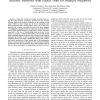Free Online Productivity Tools
i2Speak
i2Symbol
i2OCR
iTex2Img
iWeb2Print
iWeb2Shot
i2Type
iPdf2Split
iPdf2Merge
i2Bopomofo
i2Arabic
i2Style
i2Image
i2PDF
iLatex2Rtf
Sci2ools
137
click to vote
VTC
2008
IEEE
2008
IEEE
MACA-MN: A MACA-Based MAC Protocol for Underwater Acoustic Networks with Packet Train for Multiple Neighbors
Abstract— Unlike the terrestrial wireless networks that utilize the radio channel, underwater networks use the acoustic channel, which poses research challenges in the medium access control (MAC) protocol design due to its low bandwidth and high propagation delay characteristics. Since most of the MAC protocols for wireless terrestrial networks have been designed with negligible propagation delay in mind, they generally perform poorly when applied directly in underwater acoustic networks, especially for the case of handshaking-based protocols. In this paper, we propose a MACA-based MAC protocol with packet train to multiple neighbors (MACA-MN). It improves the channel utilization by forming a train of packets destined for multiple neighbors during each round of handshake, which greatly reduces the relative proportion of time wasted due to the propagation delays of control packets. This approach also reduces the hidden terminal problem. Our simulations show that the MACA-MN is able to...
| Added | 01 Jun 2010 |
| Updated | 01 Jun 2010 |
| Type | Conference |
| Year | 2008 |
| Where | VTC |
| Authors | Nitthita Chirdchoo, Wee-Seng Soh, Kee Chaing Chua |
Comments (0)

